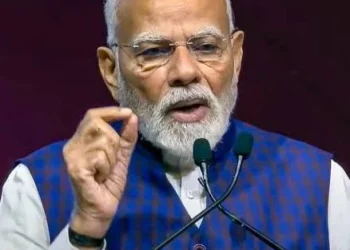In a statement that has ignited a national debate, Justice Sekhar Kumar Yadav of the Allahabad High Court declared that India should be governed by the will of the majority. Critics argue that such a position not only contradicts the Indian Constitution but also risks eroding the judiciary’s neutrality and the principles of justice, equality, and secularism.
By Navin Upadhyay
Amid ongoing debates about the independence of the judiciary, the remarks of a sitting judge of the Allahabad High Court, Justice Prashant Yadav, have sparked a massive controversy.
“This is Hindustan. I have no hesitation in saying that this country will function as per the wishes of the majority living here. This is the law,” Justice Yadav stated. He argued that societal norms, even within families, prioritize the welfare and happiness of the majority, and claimed that the same principle applies to governance.
Justice Yadav made these remarks while delivering a lecture on the “Constitutional Necessity of Uniform Civil Code,” organized by the legal cell of the Vishva Hindu Parishad (VHP) in Prayagraj.
By asserting that India should function according to the wishes of the majority, Justice Yadav has struck at the very foundation of the Indian Constitution. His statement, made at an event organized by a group often accused of divisive politics, is not just controversial—it sets a dangerous precedent that undermines the judiciary’s role as the guardian of minority rights and constitutional values.
The Constitutional Mandate
India is not a majoritarian democracy; it is a constitutional democracy. The framers of the Constitution envisioned a nation where the rights of every individual, regardless of religion, caste, or creed, would be protected. Articles 14, 15, and 21 guarantee equality, non-discrimination, and the right to life and personal liberty for all citizens. The judiciary is tasked with upholding these principles—not diluting them under the guise of reflecting the “wishes of the majority.”
Justice Yadav’s remarks that “the country will function as per the wishes of the majority” betray a fundamental misunderstanding of the constitutional mandate. Governance based solely on majority will erases safeguards for minorities, weakens justice and equity, and risks tyranny of the majority.
The Judiciary as a Neutral Arbiter
The judiciary’s role is to act as an independent and impartial arbiter of justice, especially in a pluralistic society like India. It must ensure that the majority does not trample on the rights of the minority. Justice Yadav’s comments, however, suggest an alignment with majoritarianism, raising doubts about the judiciary’s commitment to secularism and equality.
Historical Lessons
History is replete with examples of the perils of unchecked majoritarianism. The Holocaust in Nazi Germany and the Rwandan Genocide are grim reminders of the dangers of subordinating individual rights to majority will. In India, the scars of Partition, communal riots, and caste-based violence highlight why constitutional protections for minorities are indispensable.
The Dangers of Politicization
Justice Yadav’s participation in an event organized by the Vishva Hindu Parishad, a group accused of promoting divisive ideologies, raises serious concerns about judicial neutrality. When judges align with organizations espousing majoritarian views, it undermines public trust in the judiciary’s impartiality.
The Way Forward
Justice Yadav’s comments should prompt urgent introspection within the judiciary and legal fraternity. India’s democracy relies on balancing majority rule with constitutional safeguards for minorities. Judges must remember that their allegiance lies with the Constitution—not any community or ideology.
When a judge publicly endorses majoritarianism, it signals the erosion of the judiciary’s role as the last bastion of constitutional values. This is not just a moment of controversy; it is a moment of crisis. The judiciary must act decisively to reaffirm its independence and commitment to equality before it is too late.
Comments on Religious Practices
During his address, Justice Yadav also questioned practices within the Muslim community, such as polygamy, Halala, and Triple Talaq, labeling them “unacceptable” and inconsistent with equality and justice. He contrasted this with Hindu scriptures like the Shastras and Vedas, which he claimed revere women as goddesses.
Criticism of Judicial Impartiality
The event, held in the library hall of the Allahabad High Court premises, was also attended by another sitting judge, Justice Dinesh Pathak. Discussions included waqf laws, the Uniform Civil Code, and strategies to prevent religious conversions.
Justice Yadav’s past advocacy for Hindu causes—such as his 2021 call for declaring the cow a national animal and making cow protection a fundamental right—has added to his controversial image.
Political Reaction
Condemning Justice Yadav’s remarks, senior advocate Indira Jaising tweeted, “What a shame for a sitting judge to actively participate in an event organized by a Hindu organization on its political agenda.”
Hyderabad MP and AIMIM President Asaduddin Owaisi also criticized the judge’s statements. Taking to Twitter, Owaisi accused the VHP of promoting ideologies of “hate and violence” and argued that a judge’s presence at such an event undermines judicial impartiality.
Owaisi cited the AoR Association vs. Union of India case to emphasize the judiciary’s duty to protect minorities and uphold impartiality. He warned that such incidents erode public trust in the judiciary.
Broader Implications
Justice Yadav’s remarks reignite debates about the judiciary’s role in upholding secularism and impartiality in a pluralistic society. Aligning with majoritarian views risks undermining constitutional values and eroding the judiciary’s credibility as a neutral arbiter.














